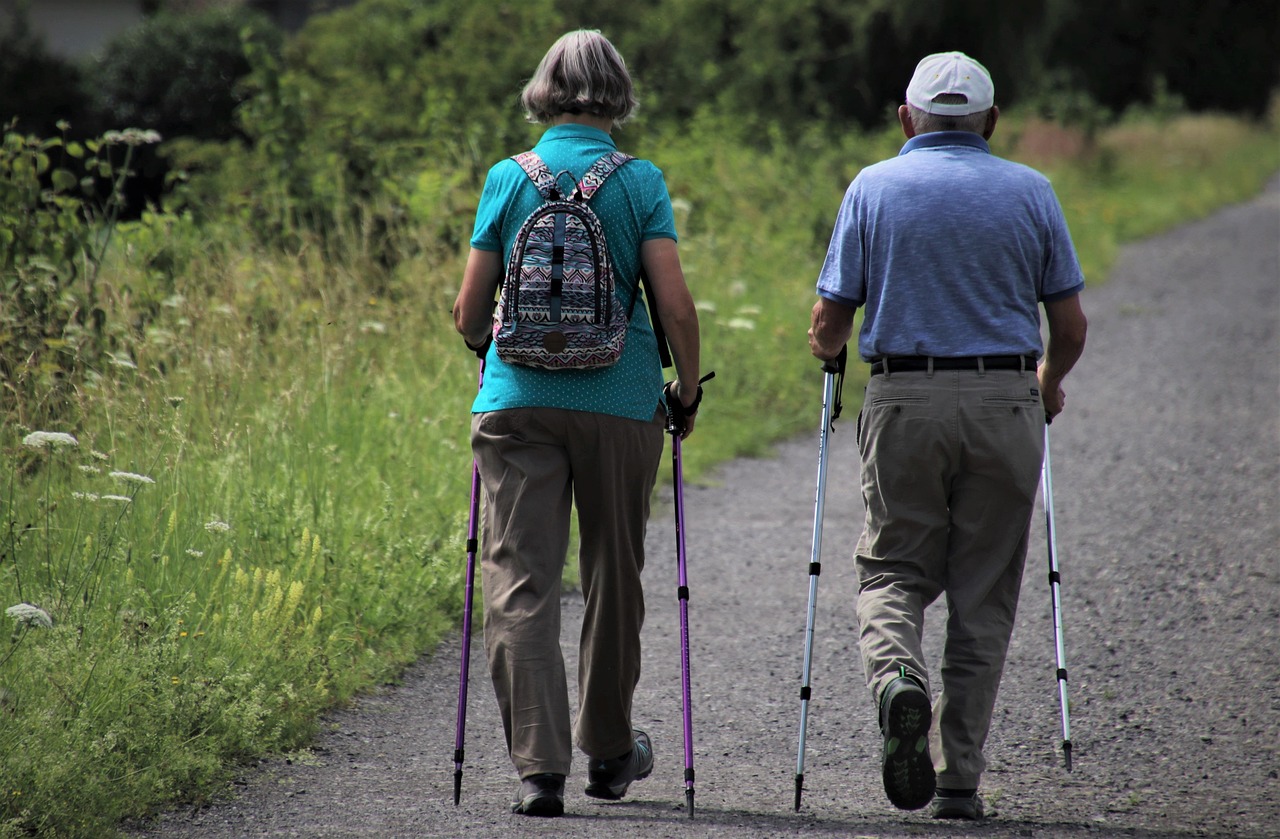The Benefits of Having a Pet for Seniors
As we age, the importance of companionship becomes increasingly evident, especially for seniors who may find themselves facing challenges such as loneliness and health issues. One of the most rewarding ways to combat these feelings is through pet ownership. Pets, whether they are lively dogs, gentle cats, or even small birds, can bring a plethora of benefits that significantly enhance the quality of life for seniors. Imagine waking up each morning to a wagging tail or a soft purr; it’s not just a pet, but a source of joy, comfort, and companionship. In this article, we will delve into the emotional, physical, and social advantages of having a pet, and how these furry (or feathered) friends can make a profound difference in the lives of seniors.
Pets provide an invaluable source of companionship, which can drastically reduce feelings of loneliness and depression among seniors. It's like having a little therapist who never judges and is always there to listen. The simple act of petting a dog or cat can release oxytocin, the "love hormone," which fosters feelings of bonding and affection. This emotional connection can significantly improve mental well-being and emotional stability. Furthermore, pets can serve as a daily reminder of the joys of life, encouraging seniors to engage with the world around them.
Beyond emotional support, owning a pet encourages seniors to engage in regular physical activity. It’s not just about taking a leisurely stroll; it's about creating a routine that promotes cardiovascular health and overall fitness. For many seniors, pets can be the motivation needed to get up and move. Whether it’s playing fetch in the backyard or going for walks in the neighborhood, these activities can lead to improved mobility and strength over time.
Regular walks and playtime with pets motivate seniors to stay active, which can lead to improved mobility and strength over time. Think of it as a gentle push to get off the couch. Not only does this physical activity help maintain a healthy weight, but it also combats the risks associated with a sedentary lifestyle. The joy of seeing a pet eagerly waiting for their daily walk can be the perfect incentive to lace up those sneakers!
Having a pet can help seniors maintain a healthy weight by encouraging a more active lifestyle, which is crucial for overall health. Studies have shown that pet owners are often more active than non-pet owners, leading to better weight management and a lower risk of obesity-related diseases.
Moreover, studies show that pet ownership can lower blood pressure and cholesterol levels, contributing to better heart health in seniors. The act of petting a dog or cat can calm the mind and body, reducing stress and promoting relaxation. Just imagine the soothing presence of a pet as you unwind after a long day; it’s like having a personal wellness coach right at home!
Pets can act as social catalysts, helping seniors connect with others in their community. Whether it’s striking up a conversation at the dog park or bonding with fellow pet owners at community events, pets foster friendships and reduce isolation. They create opportunities for social interaction that might not have existed otherwise. It’s like having a built-in icebreaker that makes meeting new people feel effortless.
Caring for a pet establishes a daily routine, providing seniors with a sense of purpose and responsibility. This structure can enhance their overall well-being and mental health. The daily responsibilities of feeding, grooming, and exercising a pet help maintain a structured schedule, which is beneficial for mental health. It’s similar to having a little daily checklist that keeps life organized and fulfilling.
Engaging in daily care responsibilities not only gives seniors a sense of accomplishment but also keeps their minds sharp. The routine of taking care of a pet can help combat cognitive decline, offering a sense of normalcy and stability in their lives.
Pets can encourage participation in community activities, such as dog parks or pet-related gatherings. These events promote social engagement and interaction, making it easier for seniors to form connections and friendships. It’s a wonderful way to meet like-minded individuals who share a love for animals.
Interacting with pets can have therapeutic effects, reducing stress and anxiety levels while promoting relaxation and emotional healing for seniors. The simple act of cuddling or playing with a pet can release endorphins, which are natural mood lifters.
Many seniors benefit from animal-assisted therapy, which can improve mood and emotional health while providing comfort and companionship. It’s incredible how the presence of a pet can brighten a gloomy day, offering a sense of hope and joy.
The presence of a pet can lower cortisol levels and increase serotonin, leading to reduced stress and enhanced feelings of happiness. Imagine coming home after a long day and being greeted by a wagging tail; it’s like a warm hug that melts away the worries of the day.
- What types of pets are best for seniors? Dogs and cats are popular choices, but smaller pets like rabbits or birds can also be great companions.
- How can pets help with loneliness? Pets provide companionship and unconditional love, which can help alleviate feelings of loneliness.
- Are there any health risks associated with pet ownership for seniors? While pets can provide many benefits, seniors should consider any allergies or mobility issues that may affect their ability to care for a pet.
- What if a senior can't take care of a pet alone? Many communities offer pet therapy programs or volunteers who can help with pet care.

Emotional Support
This article explores the various advantages of pet ownership for seniors, including emotional support, physical health benefits, and social interaction, enhancing their overall quality of life.
Pets are not just adorable companions; they play a vital role in providing to seniors. Imagine coming home after a long day and being greeted by a wagging tail or a gentle purr. This simple act can instantly lift one's spirits and reduce feelings of loneliness. For many seniors, pets become their best friends, offering unconditional love and companionship that can significantly improve mental well-being. In fact, studies have shown that seniors who own pets report lower levels of depression and anxiety.
Furthermore, the bond between a senior and their pet can create a profound sense of purpose. Caring for a pet requires daily attention and affection, which helps establish a routine that can be incredibly beneficial for mental health. It's like having a little buddy that reminds you to get out of bed and face the day with a smile. The responsibility of pet ownership can help seniors feel needed and valued, which is essential for maintaining a positive outlook on life.
Additionally, pets can act as a social bridge, helping seniors connect with others. When walking a dog, for example, it's common to strike up conversations with neighbors or fellow dog owners. These interactions can lead to new friendships and a stronger sense of community, which is particularly important for seniors who may feel isolated. The emotional benefits of pet ownership are truly multifaceted, offering not just companionship but also a way to engage with the world around them.
Here are a few key emotional benefits of having a pet:
- Reduction of Loneliness: Pets provide constant companionship, helping to alleviate feelings of isolation.
- Increased Happiness: Interaction with pets can trigger the release of oxytocin, often referred to as the "love hormone," which enhances mood.
- Enhanced Self-Esteem: Caring for a pet can boost a senior's confidence as they take on the role of a caregiver.
In summary, the emotional support provided by pets is invaluable for seniors. They not only offer companionship but also enhance mental health, foster social connections, and provide a sense of purpose. In a world where loneliness can be a significant issue for the elderly, pets emerge as a powerful antidote, proving that love truly comes in all shapes and sizes.
Owning a pet encourages seniors to engage in regular physical activity, promoting cardiovascular health and overall fitness through activities like walking and playing.
Regular walks and playtime with pets motivate seniors to stay active, which can lead to improved mobility and strength over time.
Having a pet can help seniors maintain a healthy weight by encouraging a more active lifestyle, which is crucial for overall health.
Studies show that pet ownership can lower blood pressure and cholesterol levels, contributing to better heart health in seniors.
Pets can act as social catalysts, helping seniors connect with others in their community, thereby reducing isolation and fostering friendships.
Caring for a pet establishes a daily routine, providing seniors with a sense of purpose and responsibility that can enhance their overall well-being.
Feeding, grooming, and exercising a pet helps seniors maintain a structured schedule, which can be beneficial for mental health.
Pets can encourage participation in community events, such as dog parks or pet-related gatherings, promoting social engagement and interaction.
Interacting with pets can have therapeutic effects, reducing stress and anxiety levels while promoting relaxation and emotional healing for seniors.
Many seniors benefit from animal-assisted therapy, which can improve mood and emotional health while providing comfort and companionship.
The presence of a pet can lower cortisol levels and increase serotonin, leading to reduced stress and enhanced feelings of happiness.
Q: How do pets help with loneliness in seniors?
A: Pets provide constant companionship, reducing feelings of isolation and offering emotional support.
Q: What types of pets are best for seniors?
A: Smaller, low-maintenance pets like cats or small dog breeds are often ideal, but it ultimately depends on the senior's lifestyle and preferences.
Q: Can pets really improve mental health?
A: Yes, numerous studies indicate that pet ownership can lead to lower levels of depression and anxiety, enhancing overall mental well-being.

Physical Health Benefits
This article explores the various advantages of pet ownership for seniors, including emotional support, physical health benefits, and social interaction, enhancing their overall quality of life.
Pets provide companionship, reducing feelings of loneliness and depression among seniors, which can significantly improve their mental well-being and emotional stability.
Owning a pet can be a game changer for seniors, especially when it comes to their physical health. Imagine having a furry friend that not only brings joy but also nudges you to be more active. This isn't just about taking a leisurely stroll in the park; it's about integrating movement into daily life. Regular interactions with pets, such as walking, playing, or even grooming, can lead to a more active lifestyle. This increased activity can help prevent a host of health issues, including obesity, heart disease, and even diabetes.
Regular walks and playtime with pets motivate seniors to stay active, which can lead to improved mobility and strength over time. Think about it: every time you take your dog out for a walk, you're not just doing them a favor; you're also giving yourself a mini workout! This consistent movement helps maintain flexibility and strength, which are crucial as we age. Moreover, the act of walking a pet can be more enjoyable than exercising alone, making it easier to stick to a routine.
Having a pet can help seniors maintain a healthy weight by encouraging a more active lifestyle. With a pet around, the days of lounging on the couch become less appealing. Instead, you might find yourself engaging in activities that get your heart rate up. For instance, a quick game of fetch or a playful chase around the yard can burn calories and keep those extra pounds at bay. It's like having a personal trainer who is always excited to see you!
Studies show that pet ownership can lower blood pressure and cholesterol levels, contributing to better heart health in seniors. The simple act of petting a dog or cat can trigger the release of oxytocin, a hormone that promotes bonding and reduces stress. Less stress means lower blood pressure, which is a win-win for heart health. In fact, a study published in the journal Circulation found that pet owners have a lower risk of heart disease compared to non-pet owners. So, not only do pets offer companionship, but they also play a vital role in keeping our hearts happy and healthy!
Pets can act as social catalysts, helping seniors connect with others in their community, thereby reducing isolation and fostering friendships. For example, walking a dog often leads to conversations with other pet owners, creating opportunities for social interaction that might not occur otherwise. It’s like having a built-in icebreaker wherever you go!
Caring for a pet establishes a daily routine, providing seniors with a sense of purpose and responsibility that can enhance their overall well-being.
Feeding, grooming, and exercising a pet helps seniors maintain a structured schedule, which can be beneficial for mental health.
Pets can encourage participation in community events, such as dog parks or pet-related gatherings, promoting social engagement and interaction.
Interacting with pets can have therapeutic effects, reducing stress and anxiety levels while promoting relaxation and emotional healing for seniors.
Many seniors benefit from animal-assisted therapy, which can improve mood and emotional health while providing comfort and companionship.
The presence of a pet can lower cortisol levels and increase serotonin, leading to reduced stress and enhanced feelings of happiness.
Q: What types of pets are best for seniors?
A: Smaller dogs, cats, and even smaller animals like rabbits or guinea pigs can be great companions. The key is to choose a pet that matches the senior's lifestyle and energy level.
Q: How can pets help with loneliness?
A: Pets provide companionship and unconditional love, which can significantly reduce feelings of loneliness. They also encourage social interactions with other pet owners.
Q: Are there any financial considerations for pet ownership?
A: Yes, pet ownership comes with costs such as food, vet visits, and supplies. It’s essential to budget for these expenses to ensure that both the pet and owner are well taken care of.
Q: Can pets really improve mental health?
A: Absolutely! Studies have shown that pets can reduce symptoms of anxiety and depression, providing emotional support and comfort to their owners.
Increased Activity Levels
This article explores the various advantages of pet ownership for seniors, including emotional support, physical health benefits, and social interaction, enhancing their overall quality of life.
Pets provide companionship, reducing feelings of loneliness and depression among seniors, which can significantly improve their mental well-being and emotional stability.
Owning a pet encourages seniors to engage in regular physical activity, promoting cardiovascular health and overall fitness through activities like walking and playing.
When you think about it, having a pet is like having a built-in personal trainer. Pets, especially dogs, thrive on routine and love their daily walks and playtime. This not only benefits the furry friend but also serves as an excellent motivator for seniors to stay active. Imagine lacing up your sneakers, grabbing a leash, and heading out for a stroll in the fresh air. It's not just a walk; it's an adventure waiting to unfold!
Regular walks and playtime with pets can lead to improved mobility and strength over time. For instance, a simple game of fetch in the backyard or a leisurely walk around the neighborhood can significantly enhance a senior's physical endurance. Moreover, these activities can be tailored to match the senior's fitness level, making it accessible and enjoyable.
Here are some ways pets can encourage increased activity levels:
- Daily Walks: Taking a dog for a walk not only provides exercise but also allows seniors to enjoy nature and fresh air.
- Playtime: Engaging in play with pets can be a fun workout. Whether it's tossing a ball or using interactive toys, it keeps both pet and owner active.
- Social Interaction: Walking a dog often leads to conversations with neighbors or other pet owners, adding a social element to physical activity.
Additionally, the sense of responsibility that comes with pet ownership can create a positive feedback loop. When seniors see the joy their pets experience during these activities, it encourages them to continue being active. It’s like having a little cheerleader urging you on! This engagement not only helps with physical fitness but also contributes to mental clarity and emotional well-being.
Having a pet can help seniors maintain a healthy weight by encouraging a more active lifestyle, which is crucial for overall health.
Studies show that pet ownership can lower blood pressure and cholesterol levels, contributing to better heart health in seniors.
Pets can act as social catalysts, helping seniors connect with others in their community, thereby reducing isolation and fostering friendships.
Caring for a pet establishes a daily routine, providing seniors with a sense of purpose and responsibility that can enhance their overall well-being.
Feeding, grooming, and exercising a pet helps seniors maintain a structured schedule, which can be beneficial for mental health.
Pets can encourage participation in community events, such as dog parks or pet-related gatherings, promoting social engagement and interaction.
Interacting with pets can have therapeutic effects, reducing stress and anxiety levels while promoting relaxation and emotional healing for seniors.
Many seniors benefit from animal-assisted therapy, which can improve mood and emotional health while providing comfort and companionship.
The presence of a pet can lower cortisol levels and increase serotonin, leading to reduced stress and enhanced feelings of happiness.
Q: What types of pets are best for seniors?
A: Dogs and cats are popular choices, but smaller pets like rabbits or birds can also be great companions, depending on the senior's lifestyle and living situation.
Q: How can pets help with loneliness?
A: Pets provide companionship and unconditional love, which can significantly reduce feelings of isolation and loneliness.
Q: Are there any specific health benefits of owning a dog?
A: Yes! Dogs encourage regular exercise, improve heart health, and can even lower stress levels.
Q: What if a senior has mobility issues?
A: There are many low-maintenance pets, such as cats or small animals, that require less physical activity but still provide companionship.
Weight Management
Maintaining a healthy weight is crucial for seniors, and owning a pet can significantly aid in this endeavor. When you have a furry friend by your side, it’s not just about companionship; it’s about creating a lifestyle that encourages movement and activity. Think of your pet as a personal trainer who never gets tired of motivating you! Regular walks, playtime, and even simple chores like feeding and grooming can contribute to a more active daily routine.
For instance, a simple evening stroll with your dog can turn into a delightful ritual that not only helps you shed a few pounds but also strengthens the bond between you and your pet. This kind of engagement can make a world of difference in your overall health. Studies have shown that pet owners tend to be more active than non-pet owners, which can lead to better weight management.
Moreover, the joy of having a pet often translates into a more structured daily routine. When you have to care for a pet, you naturally find yourself moving more throughout the day. Here are some ways pet ownership can help with weight management:
- Regular Exercise: Walking your dog or playing fetch provides regular physical activity that can help burn calories.
- Increased Motivation: Pets can motivate you to stay active, as they rely on you for their exercise and playtime.
- Social Engagement: Joining pet-related activities, like dog walking groups, can increase your social interactions while keeping you active.
In conclusion, having a pet not only brings joy and companionship but also encourages seniors to lead a more active lifestyle, which is essential for effective weight management. So, if you’re considering adding a pet to your life, remember that it’s not just about cuddles and companionship; it’s about a healthier, more active you!
Improved Heart Health
When it comes to heart health, the benefits of pet ownership can be truly remarkable. Research has shown that having a furry companion can significantly lower blood pressure and cholesterol levels, which are vital for maintaining a healthy heart. Imagine waking up to the soft purring of a cat or the wagging tail of a dog; these simple moments can trigger a cascade of positive physiological responses in our bodies.
One of the most fascinating aspects of pet ownership is its ability to reduce stress, a major contributor to heart disease. When you pet your dog or cuddle with your cat, your body releases oxytocin, the "feel-good" hormone. This not only enhances your mood but also helps in lowering cortisol levels, which is linked to stress. Lower stress means a healthier heart! It's like having a built-in therapist that never judges and is always there to lend a paw.
Moreover, the act of walking your dog can serve as a fun and effective form of exercise. Regular physical activity is crucial for heart health, and what better motivation than a loyal pet eager for their daily stroll? This can lead to a more active lifestyle, which is essential for maintaining a healthy weight and reducing the risks associated with cardiovascular diseases.
To put it simply, pet ownership creates a win-win scenario for seniors looking to boost their heart health. Here are some ways pets contribute to better heart health:
- Lower Blood Pressure: Regular interaction with pets can lead to lower blood pressure readings.
- Decreased Cholesterol Levels: Pet owners often experience a reduction in cholesterol levels, contributing to overall heart health.
- Increased Physical Activity: Walking and playing with pets encourages seniors to stay active, which is vital for cardiovascular fitness.
In conclusion, the connection between pets and improved heart health is backed by science and enriched by the emotional bonds we share with our furry friends. The joy they bring into our lives can lead to healthier hearts and happier lives, making pet ownership a truly rewarding experience for seniors.
- What types of pets are best for seniors? Small dogs, cats, and even fish can be great companions for seniors, depending on their lifestyle and preferences.
- How can pets help with loneliness? Pets provide unconditional love and companionship, which can significantly reduce feelings of loneliness.
- Are there any specific breeds recommended for seniors? Breeds that are known for being calm and easy-going, such as Cavalier King Charles Spaniels or Shih Tzus, are often recommended for seniors.
Enhanced Social Interaction
One of the most remarkable benefits of having a pet, especially for seniors, is the that comes along with it. Imagine walking into a park, and instantly, your furry friend becomes a magnet for conversation. Other dog owners often stop to chat, share stories, and even exchange tips on training and care. This simple act of walking a pet can lead to new friendships and a sense of belonging that many seniors crave.
Pets serve as a social catalyst, breaking down barriers and making it easier for seniors to connect with others. Whether it’s a friendly bark from a dog or the playful antics of a cat, these interactions can spark conversations that might not have happened otherwise. It's like having a built-in icebreaker! For many seniors, this newfound social engagement can significantly reduce feelings of isolation and loneliness.
Moreover, pets can encourage seniors to participate in community activities. Dog parks, pet-friendly events, and even local pet shows provide opportunities for seniors to mingle with others who share similar interests. These gatherings can foster a sense of community and belonging, which is crucial for mental health. Just think about it: a senior walking a dog might meet someone else with a similar routine, leading to regular meet-ups and a blossoming friendship.
Additionally, the joy of caring for a pet can lead to conversations with neighbors and friends. When seniors share stories about their pets, it often brings smiles and laughter, creating a positive atmosphere. It’s not just about the pets; it’s about the connections they help forge. In essence, pets not only provide companionship but also serve as a bridge to a more vibrant social life.
In conclusion, the enhanced social interaction that pets offer to seniors is invaluable. It’s not just about having a companion; it's about opening doors to new relationships, fostering community ties, and enriching one's life with shared experiences. So, if you’re considering pet ownership, remember that you’re not just bringing home a furry friend; you’re also inviting a world of social opportunities into your life.
- How can pets help reduce loneliness in seniors?
Pets provide companionship and a sense of responsibility, which can help alleviate feelings of loneliness and isolation.
- What types of pets are best for seniors?
Smaller dogs, cats, and even fish can be great companions for seniors, depending on their lifestyle and living arrangements.
- Are there any community resources for seniors with pets?
Many communities offer pet-friendly events and support groups for seniors, which can be a great way to meet others and socialize.
- Can pets improve mental health in seniors?
Yes, studies have shown that interacting with pets can reduce stress, anxiety, and depression, leading to improved mental well-being.

Routine and Structure
Having a pet is like having a built-in alarm clock that not only wakes you up but also gives your day a sense of purpose. For seniors, establishing a daily routine can be incredibly beneficial, and pets play a crucial role in this. When you have a furry friend relying on you for food, exercise, and affection, it encourages a structured schedule that can enhance overall well-being. Imagine starting your day with a wagging tail or a soft purr, reminding you that it’s time to get up and get moving. This simple act can be a game-changer, providing motivation to rise and shine!
Daily care responsibilities associated with pet ownership can help seniors maintain a structured lifestyle. Tasks such as feeding, grooming, and walking a pet not only create a routine but also instill a sense of responsibility. This structure is vital, as it can combat feelings of aimlessness or boredom that sometimes accompany aging. For instance, you might find yourself looking forward to the daily ritual of feeding your pet or taking them for a stroll around the neighborhood. These activities can be both fulfilling and invigorating.
Moreover, pets encourage involvement in community activities, which is another significant advantage of their companionship. They can act as social magnets, drawing seniors into interactions with others. For example, taking your dog to a local park can lead to conversations with fellow pet owners, fostering new friendships and connections. These social engagements can be enriching, reducing feelings of isolation and loneliness. In fact, many seniors report that their pets have helped them meet new people and engage more actively in their communities.
To illustrate the impact of routine and structure provided by pets, consider the following table that outlines the daily responsibilities and their benefits:
| Daily Responsibility | Benefits |
|---|---|
| Feeding | Encourages consistency and provides a sense of purpose. |
| Walking | Promotes physical activity and enhances cardiovascular health. |
| Grooming | Fosters bonding and improves mental health through interaction. |
| Playtime | Stimulates both mental and physical engagement, reducing stress. |
In summary, the routine and structure that come with pet ownership can significantly enhance the quality of life for seniors. The daily responsibilities not only provide a sense of purpose but also encourage physical activity and social interaction, creating a fulfilling and vibrant lifestyle. So, if you’re a senior considering a pet, remember that you’re not just gaining a companion; you’re also inviting a new rhythm into your life that can lead to greater happiness and well-being.
- What types of pets are best for seniors? Smaller, low-maintenance pets like cats or small dog breeds are often ideal, as they require less physical exertion.
- Can pets help with mental health issues? Yes, pets provide emotional support and companionship, which can alleviate feelings of loneliness and depression.
- How can pets encourage physical activity? Pets require regular walks and playtime, which motivates seniors to stay active and engaged.
- What if I can’t take care of a pet full-time? Consider adopting a pet that requires less care or look into pet-sharing programs in your community.
Daily Care Responsibilities
Caring for a pet is not just a delightful experience; it also brings a sense of routine and responsibility into the lives of seniors. Each day, pet owners engage in various tasks that not only benefit their furry friends but also contribute significantly to their own well-being. Think about it—when you wake up to the cheerful bark of a dog or the gentle purr of a cat, it sets a positive tone for the day. This daily interaction fosters a sense of purpose, as seniors know that their pets depend on them for care and companionship.
One of the primary responsibilities involves feeding the pet. This simple act can be quite rewarding. It’s not just about filling a bowl; it’s about ensuring that their pet receives the right nutrition to stay healthy and happy. Seniors often find joy in preparing meals, which can lead to better dietary habits for themselves as well. After all, when you’re cooking for your pet, you might just whip up something healthy for yourself, too!
Grooming is another essential aspect of pet care. Regularly brushing a pet’s fur or giving them a bath can be a soothing ritual. It’s a time for bonding, where seniors can reflect on their day while engaging in a calming activity. Moreover, this routine helps in maintaining the pet's hygiene, which is crucial for their health. A clean pet is a happy pet, and a happy pet contributes to a happy home!
Exercise is vital for both pets and their owners. Taking a dog for a walk or playing with a cat can significantly increase physical activity levels. For seniors, this means more than just getting some fresh air; it’s an opportunity to stretch those muscles, improve flexibility, and boost cardiovascular health. Engaging in these activities can combat feelings of lethargy and encourage a more active lifestyle.
To further illustrate the daily care responsibilities, consider the following table that highlights various tasks and their benefits:
| Task | Benefits |
|---|---|
| Feeding | Promotes healthy eating habits and a sense of purpose. |
| Grooming | Enhances bonding and provides a calming routine. |
| Walking | Encourages physical activity and improves cardiovascular health. |
| Playtime | Stimulates mental engagement and reduces stress. |
In addition to these responsibilities, seniors may also find themselves involved in vet visits and ensuring their pets receive regular check-ups. This not only helps keep the pets healthy but also encourages seniors to stay on top of their health appointments. It’s a win-win situation! By taking care of their pets, seniors inadvertently take better care of themselves.
Ultimately, the daily care responsibilities associated with pet ownership create a structured environment that can significantly enhance a senior's quality of life. It’s about more than just the tasks; it’s about the connection, love, and joy that pets bring into their lives. So, whether it's the wagging tail greeting them at the door or the soothing purr that accompanies their evening relaxation, pets provide a fulfilling routine that enriches the lives of seniors in countless ways.
- What are the best pets for seniors? - Small dogs, cats, and even fish can be great companions for seniors, depending on their lifestyle and living situation.
- How can I afford pet care? - Consider adopting from shelters, which often have lower fees, and look for community resources that assist with pet care costs.
- Can pets help with loneliness? - Absolutely! Pets provide companionship and unconditional love, which can greatly reduce feelings of loneliness.
- What if I have mobility issues? - Many pets, such as cats or smaller dog breeds, require less physical activity, making them suitable for seniors with mobility concerns.
Involvement in Community Activities
When seniors own pets, they often find themselves stepping out of their comfort zones and into the vibrant world of community activities. Imagine this: a sunny Saturday morning at the local dog park, where the laughter of children mingles with the joyful barks of dogs. It’s not just about the pets; it’s about the connections that form around them. Pet ownership can act as a magnet for social interaction, drawing seniors into a variety of community events that they might otherwise miss out on. Whether it’s participating in dog training classes, attending pet shows, or joining local pet clubs, these activities offer seniors a chance to engage with others who share similar interests.
Moreover, many towns and cities organize pet-centric events that foster a sense of belonging and community spirit. These can include:
- Pet adoption drives
- Charity walks
- Pet costume contests
- Workshops on pet care and training
Such events not only provide opportunities for socializing but also allow seniors to contribute to their communities. Imagine walking alongside fellow dog lovers, sharing stories about their furry companions, and even making new friends. The shared experience of caring for a pet creates an instant bond, transforming casual acquaintances into lasting friendships. Plus, being part of a community can significantly reduce feelings of isolation, which is a common challenge for many seniors.
Additionally, involvement in community activities can enhance a senior’s mental and emotional well-being. The excitement of preparing for an event, the joy of meeting new people, and the satisfaction of being part of something larger than oneself can invigorate their spirits. It’s like a breath of fresh air that revitalizes their daily routine. Not to mention, these activities can also spark a sense of purpose—something that is incredibly valuable as one ages.
In conclusion, the involvement in community activities through pet ownership is a win-win situation. Not only do seniors get to enjoy the companionship of their pets, but they also gain a network of support and friendship that enriches their lives. So, if you’re a senior considering a pet, think about the broader horizons that await you in your community. You might just find that your furry friend opens the door to a whole new world of social engagement!
Q: How can pets help seniors make new friends?
A: Pets often serve as conversation starters, allowing seniors to connect with fellow pet owners at parks, community events, and pet-related gatherings.
Q: What types of community activities can seniors participate in with their pets?
A: Seniors can join dog training classes, attend pet shows, participate in charity walks, and engage in local pet clubs, among other activities.
Q: Are there any health benefits associated with participating in community activities with pets?
A: Yes! Engaging in community activities can reduce feelings of isolation, promote mental well-being, and encourage physical activity, all of which contribute to better overall health.

Therapeutic Benefits
When we think about the of having a pet, it’s like opening a treasure chest filled with emotional gold! Pets have an incredible ability to enhance our mental health, especially for seniors who may be facing loneliness or anxiety. Just imagine coming home after a long day, and there’s your furry friend, tail wagging and eyes sparkling with joy. That simple act of greeting can lift your spirits in ways you might not even realize.
Studies have shown that interacting with pets can significantly reduce stress and anxiety levels. The act of petting a dog or cat releases oxytocin, often referred to as the "love hormone." This biochemical reaction helps to create feelings of bonding and trust, which can be particularly beneficial for seniors who may feel isolated. Moreover, pets can serve as a source of unconditional love, providing comfort and companionship that can ease feelings of depression.
One fascinating aspect of pet ownership is its role in animal-assisted therapy. Many therapy programs incorporate animals to help individuals cope with various mental health challenges. For seniors, this can mean participating in sessions where they interact with trained therapy animals. The presence of these animals can improve mood, reduce feelings of loneliness, and even encourage seniors to open up about their feelings. It's like having a furry therapist who listens without judgment!
Additionally, the simple act of caring for a pet can provide a sense of purpose and routine. When seniors have a pet, they are often more inclined to get out of bed in the morning, knowing that their furry companion depends on them for care. This daily responsibility can lead to increased feelings of self-worth and stability, which are crucial for maintaining mental health.
But wait, there’s more! The physical touch associated with pet ownership can also have profound therapeutic effects. Just think about how soothing it feels to cuddle with a pet after a stressful day. This physical interaction can lower cortisol levels—the hormone responsible for stress—and increase serotonin, a neurotransmitter that contributes to feelings of well-being and happiness. In essence, pets can be a natural remedy for stress relief!
In conclusion, the therapeutic benefits of having a pet go beyond mere companionship. They encompass emotional healing, stress reduction, and even physical well-being. Whether it’s through animal-assisted therapy or the simple joy of daily interactions, pets undoubtedly play a vital role in enhancing the quality of life for seniors. So, if you’re considering bringing a furry friend into your life or the life of a loved one, know that you might just be opening the door to a world of healing and happiness.
- What types of pets are best for seniors? Generally, smaller pets like cats and small dog breeds are easier to manage and require less physical activity, making them ideal for seniors.
- How do pets help with loneliness? Pets provide companionship, which can significantly reduce feelings of isolation and loneliness in seniors.
- Can pets improve mental health? Yes, studies have shown that pets can help reduce anxiety, depression, and stress levels, contributing to overall mental well-being.
- What are animal-assisted therapy programs? These are therapeutic programs that involve trained animals to help individuals cope with emotional or psychological issues.
Animal-Assisted Therapy
Animal-assisted therapy (AAT) is a remarkable approach that harnesses the power of our furry friends to bring about positive changes in the lives of seniors. Imagine walking into a room where a gentle golden retriever greets you with a wagging tail and a friendly nuzzle. Instantly, the atmosphere shifts, and a smile spreads across your face. This is the magic of AAT! It’s not just about having a pet; it’s about enhancing mental and emotional well-being through structured interactions with animals.
Research shows that seniors who engage in AAT often experience significant improvements in their mood and emotional health. The simple act of petting a dog or cat can release endorphins, those feel-good hormones that help combat feelings of anxiety and depression. In fact, many therapy animals are specially trained to provide comfort and companionship, making them perfect partners for seniors seeking emotional support. Just think of them as furry therapists, always ready to lend an ear (or a paw) without judgment!
Moreover, AAT sessions are often designed to meet specific therapeutic goals. For instance, a therapy dog might help a senior practice their speech or improve their mobility by encouraging them to engage in gentle activities like walking or tossing a ball. This kind of interaction not only promotes physical health but also fosters a sense of accomplishment and joy. It’s a win-win situation!
To give you a clearer picture, let’s take a look at some of the key benefits of animal-assisted therapy for seniors:
| Benefit | Description |
|---|---|
| Emotional Healing | Interacting with therapy animals can significantly reduce feelings of loneliness and despair, leading to improved emotional stability. |
| Physical Activity | Engaging with pets encourages movement, which is vital for maintaining physical health and mobility. |
| Social Connections | Pets can act as social bridges, helping seniors connect with caregivers, family, and peers. |
| Stress Relief | The presence of an animal can lower stress levels, promoting relaxation and overall well-being. |
It’s essential to note that AAT is not just about having any pet; it’s about the right kind of interaction. Trained therapy animals are equipped to handle various situations and can adapt to the emotional needs of seniors. This tailored approach ensures that each individual receives the maximum therapeutic benefit. So, whether it’s a soft rabbit, a playful dog, or a serene cat, the right animal can make all the difference in enhancing a senior's quality of life.
In conclusion, animal-assisted therapy offers a unique blend of companionship, emotional support, and physical activity that can profoundly impact seniors. As they engage with these wonderful creatures, they not only find joy and comfort but also a renewed sense of purpose. If you or a loved one is considering AAT, it’s worth exploring the many programs available that can connect seniors with these life-changing furry companions.
- What is animal-assisted therapy? AAT is a therapeutic intervention that involves animals to help improve a person's emotional, social, and physical well-being.
- How does AAT benefit seniors? AAT can reduce feelings of loneliness, promote physical activity, and enhance emotional health through structured interactions with animals.
- Are all pets suitable for therapy? No, therapy animals are specifically trained to provide comfort and support, ensuring the best outcomes for those they assist.
- How can I find AAT programs for seniors? Many local hospitals, nursing homes, and community centers offer AAT programs. A quick online search can help you find options in your area.
Stress Reduction
When it comes to managing stress, having a pet can be a game-changer for seniors. The simple act of petting a furry friend can trigger a cascade of positive reactions in the brain. It's almost like magic! When you stroke a dog or cuddle with a cat, your body releases oxytocin, often referred to as the "love hormone." This hormone not only fosters feelings of affection but also significantly reduces stress and anxiety levels.
Imagine coming home after a long day, feeling the weight of the world on your shoulders. Then, there’s your loyal dog, wagging its tail and ready to greet you with unconditional love. In that moment, all your worries seem to fade away. Studies have shown that interacting with pets can lower cortisol levels, the hormone primarily responsible for stress. By simply spending time with a pet, seniors can experience a profound sense of calm, leading to an overall improvement in their mental health.
Furthermore, pets can provide a comforting presence during difficult times. For seniors dealing with loss, loneliness, or health issues, the companionship of a pet can be incredibly therapeutic. The rhythmic sound of a cat purring or the gentle nudge of a dog can create an atmosphere of tranquility, making it easier to cope with life's challenges. In fact, many therapists now incorporate animal-assisted therapy into their practice, recognizing the immense benefits that pets can provide.
To illustrate the impact of pets on stress reduction, consider the following table that highlights some key benefits:
| Benefit | Description |
|---|---|
| Lower Cortisol Levels | Petting and playing with pets can significantly reduce the levels of cortisol, a stress hormone. |
| Increased Serotonin | Interaction with pets boosts serotonin levels, leading to improved mood and happiness. |
| Enhanced Relaxation | The presence of pets creates a calming environment that fosters relaxation and reduces anxiety. |
In conclusion, the bond between seniors and their pets can serve as a powerful antidote to stress. By nurturing this relationship, seniors not only enhance their emotional well-being but also cultivate a more peaceful and fulfilling life. So, if you’re a senior considering pet ownership, remember that the furry companion you choose could be your ticket to a happier, stress-free existence.
- What types of pets are best for seniors? While dogs and cats are popular choices, smaller pets like rabbits or hamsters can also be great companions, depending on the senior's lifestyle and preferences.
- How can pets help with loneliness? Pets provide companionship and unconditional love, which can help alleviate feelings of isolation and loneliness.
- Are there any specific breeds of dogs that are better for seniors? Breeds known for their calm demeanor, such as Cavalier King Charles Spaniels or Bichon Frises, are often recommended for seniors.
- Can pet ownership improve physical health? Yes, pets encourage physical activity, which can lead to better overall health and fitness.
Frequently Asked Questions
- What are the emotional benefits of having a pet for seniors?
Pets offer companionship, which can significantly reduce feelings of loneliness and depression in seniors. The unconditional love and affection from pets can enhance emotional stability and improve overall mental well-being.
- How do pets contribute to physical health for older adults?
Owning a pet encourages seniors to engage in regular physical activities, such as walking or playing. This not only promotes cardiovascular health but also aids in maintaining a healthy weight and improving mobility.
- Can pets help seniors socialize more?
Absolutely! Pets can act as social catalysts, making it easier for seniors to connect with others in their community. Whether it's at the dog park or through pet-related events, pets can foster friendships and reduce isolation.
- Do pets help establish a daily routine for seniors?
Yes, caring for a pet requires a structured schedule for feeding, grooming, and exercising. This routine can provide seniors with a sense of purpose and responsibility, which is beneficial for their mental health.
- What are the therapeutic benefits of interacting with pets?
Interacting with pets can have calming effects, reducing stress and anxiety levels. The presence of a pet can lower cortisol and increase serotonin, leading to enhanced feelings of happiness and relaxation.
- Is animal-assisted therapy effective for seniors?
Yes! Many seniors benefit from animal-assisted therapy, which can improve mood and emotional health. The comfort and companionship provided by animals can be incredibly therapeutic.
- How can pets help with weight management in seniors?
Having a pet encourages a more active lifestyle, as regular walks and playtime motivate seniors to stay fit. This increased activity can help maintain a healthy weight, which is crucial for overall health.
- What impact do pets have on heart health for seniors?
Studies have shown that pet ownership can lead to lower blood pressure and cholesterol levels, contributing to better heart health in seniors. The emotional bond with pets can also promote a healthier lifestyle.



















